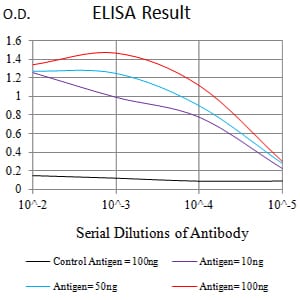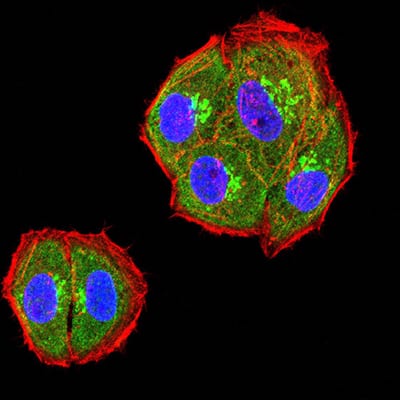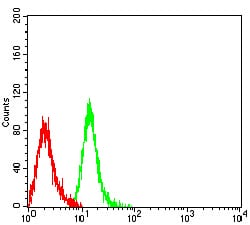


| WB | 咨询技术 | Human,Mouse,Rat |
| IF | 咨询技术 | Human,Mouse,Rat |
| IHC | 咨询技术 | Human,Mouse,Rat |
| ICC | 1/200 - 1/1000 | Human,Mouse,Rat |
| FCM | 1/200 - 1/400 | Human,Mouse,Rat |
| Elisa | 1/10000 | Human,Mouse,Rat |
| Aliases | HAVCR2; CD366; KIM-3; TIMD3; Tim-3; TIMD-3; HAVcr-2 |
| Entrez GeneID | 84868 |
| clone | 7C8A7 |
| WB Predicted band size | 33.4kDa |
| Host/Isotype | Mouse IgG1 |
| Antibody Type | Primary antibody |
| Storage | Store at 4°C short term. Aliquot and store at -20°C long term. Avoid freeze/thaw cycles. |
| Species Reactivity | Human |
| Immunogen | Purified recombinant fragment of human TIM3 (AA: extra 22-202) expressed in HEK293 cells. |
| Formulation | Purified antibody in PBS with 0.05% sodium azide |
+ +
以下是3篇与TIM3抗体相关的研究文献及其摘要概括:
---
1. **文献名称**:*TIM-3 blockade promotes anti-tumor immunity in ovarian cancer*
**作者**:Ngiow SF, et al.
**摘要**:该研究探讨了TIM-3抗体在卵巢癌模型中的作用,证明阻断TIM-3可增强CD8+ T细胞的抗肿瘤活性,并与PD-1抑制剂联用显著抑制肿瘤生长,提示TIM-3是免疫治疗潜在靶点。
2. **文献名称**:*Anti-TIM3 antibody promotes T cell immunity and enhances efficacy of cancer vaccines*
**作者**:Sakuishi K, et al.
**摘要**:研究发现TIM-3在耗竭T细胞中高表达,使用抗体阻断TIM-3可恢复T细胞功能,增强肿瘤疫苗疗效,为联合免疫治疗策略提供了实验依据。
3. **文献名称**:*TIM3+ Treg cells are critical for immunosuppression in tumors*
**作者**:Gao X, et al.
**摘要**:该文献揭示了肿瘤微环境中TIM-3+调节性T细胞(Treg)的免疫抑制功能,使用TIM-3抗体可减少Treg浸润并增强抗肿瘤免疫,提示靶向TIM-3可打破肿瘤免疫耐受。
---
以上文献均聚焦于TIM-3在肿瘤免疫逃逸中的作用及抗体治疗的潜在价值,涵盖机制探索与联合治疗策略。如需具体期刊和年份,建议通过PubMed或Google Scholar进一步检索。
The T-cell immunoglobulin and mucin-domain containing-3 (TIM3), encoded by the *HAVCR2* gene, is an immune checkpoint receptor expressed on activated T cells, natural killer (NK) cells, dendritic cells, and macrophages. It regulates immune tolerance and contributes to T-cell exhaustion in chronic infections and cancers. TIM3 interacts with ligands such as phosphatidylserine (exposed on apoptotic cells), galectin-9. HMGB1. and CEACAM1. modulating immune responses through inhibitory signaling pathways. In healthy contexts, TIM3 helps maintain immune homeostasis by suppressing excessive inflammation. However, tumors often exploit TIM3 upregulation to evade immune surveillance, making it a therapeutic target.
TIM3 antibodies are designed to block these inhibitory interactions, thereby restoring T-cell function and enhancing anti-tumor immunity. Preclinical studies show that TIM3 blockade synergizes with anti-PD-1/PD-L1 therapies, addressing resistance to single-agent checkpoint inhibitors. Clinical trials are evaluating TIM3-targeting monoclonal antibodies (e.g., cobolimab, sabatolimab) in advanced cancers, often in combination regimens. Challenges include identifying predictive biomarkers and managing immune-related adverse events. Research also explores TIM3's role in autoimmune diseases, where its inhibition may exacerbate pathology, highlighting context-dependent therapeutic implications. Overall, TIM3 antibodies represent a promising frontier in immuno-oncology, with ongoing efforts to optimize their clinical utility.
×